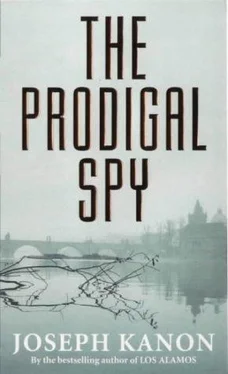The office, a suite of rooms, was on the fifth floor of the Justice Department, past a secretarial pool and a corridor lined with autographed pictures and plaques and framed awards, the tokens of a grateful nation. The visitors’ office made Welles’s look like a closet: a huge room with an oversize desk between two flags, whose only purpose seemed to be for taking pictures. A vast blue rug with the Bureau seal. A ghoulish death mask, mounted-Dillinger, 1934. More photographs, all of them with Hoover. Burly, in a double-breasted suit and crisp fedora, leading a fugitive up the stairs. Bending over to shake hands with Shirley Temple.
Nick’s escorts knocked on the inner office door, nodded to the prim woman in a high collar who opened it, and backed away, like courtiers. One more large room, with windows looking out over Pennsylvania Avenue, this one for working-a line of wooden memo trays, another football-field desk, with telephones and a single open file. Standing behind the desk was the director himself, bulldog jaw sticking out just like it did in his pictures, glowering up at Nick with a theatrical intensity. A silence.
“Am I under arrest?” Nick said.
“No. I want to talk to you,” Hoover said, the words coming as fast as bullets. Nick wondered if he had worked on it, practicing in front of a mirror until speech too had become an intimidating prop. “I hear you want to talk to me. If you don’t, you can leave right now. I’m a busy man. Thank you, Miss Gandy,” he said to the secretary, so that, ironically, the next sound Nick heard was the door clicking shut behind him.
“Now we could start friendly, but I haven’t got the time. Nobody bothers my agents, Mr Warren. Nobody. Interrogating them. Who do you think you are? Of course I know who you are.” He tapped the open file with his finger. “The only reason I’m talking to you at all is that your father’s been a friend to the Bureau.” Nick realized after a second of confusion that in Washington he was always Larry’s son first. “Sometimes. Depending. But I don’t hold grudges, and the Bureau takes care of its friends.”
“I’ll bet.”
Hoover jerked his round head and stared at Nick. “Don’t do that again,” he said evenly. “Talk smart to your father. Maybe he’s used to it. I don’t like it. As far as I’m concerned, you’re just some kid who thinks he’s having fun with the Bureau, and that’s not smart. Ask your father, he’ll tell you.”
“He’s my stepfather.”
“I know that too. I know everything about you.” He touched the file again. “War record. Not much, but at least you weren’t one of the dodgers. I’m not surprised you changed your name. We can’t help our parents-I don’t hold that against you. Maybe I should. They usually don’t fall far from the tree. But right now I just want to know what you think you’re doing. Talking to Lapierre, playing cute with us in New York.”
“I wasn’t trying to play cute. I just left early. They weren’t there around the clock.”
“You’re not worth twenty-four-hour surveillance,” Hoover said. “You’re not that important.”
“I’m not that important now, either. So call off the guys you have watching me here. I haven’t done anything. If there’s something you want to know, ask and I’ll tell you. I don’t like being followed. I had enough of that in Prague. But you expect it there. I didn’t think we were like that yet.”
Hoover peered at him curiously, sizing him up, then moved out from behind the desk. Involuntarily Nick glanced down to see if his shoes had lifts. Hoover had always been described as short, but here, on his carefully constructed set, the sight lines seemed to exaggerate his bulk, and the broad shoulders and thick neck gave the impression of a large man barely contained by his suit. What caught Nick’s eye, however, was the hair, short but still dark, at his age a color that could only have come from a bottle. Nick wondered if he did it himself, towel wrapped around his neck at the mirror, or if a barber had been sworn to secrecy.
“Not yet, Mr Warren. And we’re not going to be. We’ve still got a free country here, no thanks to people like Walter Kotlar. Why did you go see him?”
“Because he asked me to. Look, you’re busy-let me make this easy for you. He sent a message that he wanted to see me. I went. I spent a few days with him and his wife. He didn’t tell me any state secrets and he didn’t tell me about the old days. He did tell me that he was sick and he’d like to come home. One of your people there-a legat, isn’t that what you call them?”
Hoover nodded almost imperceptibly.
“A legat found out about it and ran with it, all the way back to the Bureau, where they started ringing bells so loud even you heard them. Is that about right so far? But he didn’t come back. He killed himself. I found him. The Czech police thought I did it, or caused it somehow, or whatever. Who knows what they think? I wasn’t going to hang around to find out. I got out as fast as I could, only to come home and get the same treatment from you. Which I would like you to stop.”
Hoover looked at him for a moment. “I know all that,” he said finally. That doesn’t tell me anything.“
“What do you want to know?”
“Why he thought he could come back.”
“I don’t know that he did think it. He just said he wanted to.” Nick paused. “He didn’t know you had the lighter.”
Hoover said nothing, stone-faced.
“I’d like it back, by the way. It’s mine now. It’s not evidence anymore. He’s dead.”
“You’re talking about Bureau property.”
“No, I’m not. The Bureau doesn’t officially have it. You do. You’ve always had it. In one of your special files. Just in case. But you can’t get him anymore. He got away again.”
“You think you know all about it.”
“No. Just that it was you. All along. You fed Welles. You fed McCarthy. That was your little war. Years of it.”
“You think it wasn’t a war? You’re too young to know, all of you. The only reason you’re walking around free today is-” He stopped. “It was a war. And we won it.”
“Well, you did anyway. You’re still here.” Hoover glared at him. “And so is the lighter. The one time you really had somebody and he slipped through your fingers. But at least you could always get him for something he didn’t do-if he came back.”
“He did do it.”
“Your agents don’t think so. Neither did the police.”
Hoover looked at him steadily, his voice low. “But I did. Naturally you don’t want to.”
“It doesn’t matter what we think anymore, does it?”
“Then why are you bothering Lapierre? Nosing around where you don’t belong? What are you really doing in Washington?”
“Research. Not your kind. History, that’s what it is now. It’s important to talk to who was there while they’re still around.”
Hoover’s eyes widened as if he’d been personally insulted. “Research,” he said sarcastically. “For who? That pink in London you’ve been working with?”
“Yes, that pink.”
He snorted. “Not far from the tree. Well, not with my agents, you’re not. Don’t expect any help from this office. And keep the Bureau out of it.” Hoover held up a finger. “I mean that. I’m not interested in history.”
And Nick saw suddenly that it was true, that all the stagecraft was there not to trick the future but to keep things going now, attorney general after attorney general, Hoover still at the desk. The only idea he’d ever had was to hold on to his job.
“Then it won’t matter,” he said.
“You know,” Hoover said, more slowly now, “a lot of people come into this office just set on showing me they’re not afraid of me. It’s a thing I’ve noticed. Smart talk. They don’t leave that way.”
Читать дальше












